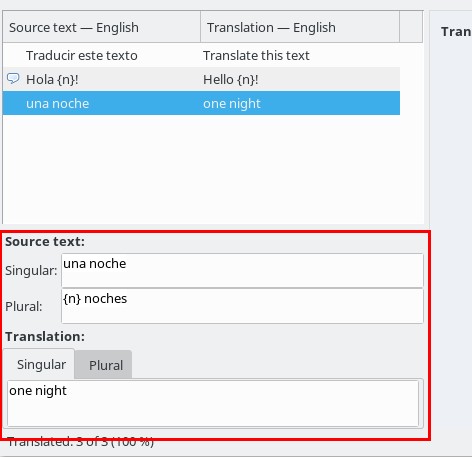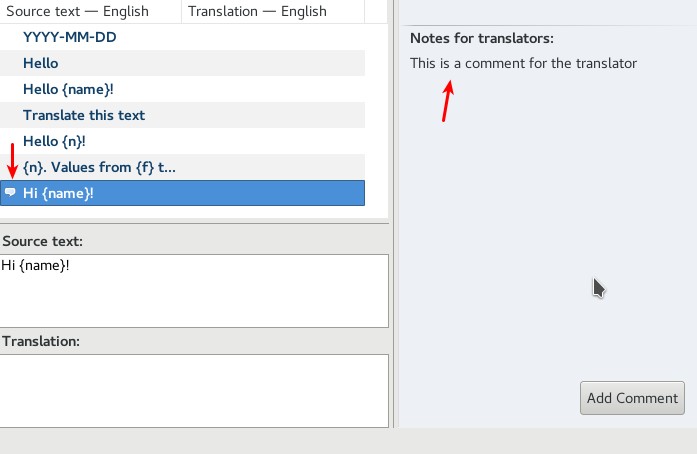redux-i18n is a simple and powerful package for translate your react application with react-redux.
npm i redux-i18n --save
- Tool for translating your React projects.
- Designed to react-redux.
- Compatible with Immutable.js.
- You can export your translations into POT files (Poedit).
- You can import from .PO files to translations.js object.
- You can add comments for translators.
- node >= 4.0.0
This package provide a parent component that encapsulate your application. See this example for understand it.
import I18n from "redux-i18n"
// with Immutable.js:
import I18n from "redux-i18n/immutable"
import {translations} from "./translations"
class MainApp extends React.Component {
render() {
return (
<I18n translations={translations}>
<div>
<h1>My Project</h1>
{this.props.children}
</div>
</I18n>
)
}
}Where translations is a dictionary as this:
export const translations = {
es: {
"Translate this text": "Traduce este texto",
"Hello {n}!": "Hola {n}!",
}
}In your combineReducers you should add i18nState reducer.
import {otherreducers} from "./Yourproject"
import {i18nState} from "redux-i18n"
// with Immutable.js:
import {i18nState} from "redux-i18n/immutable"
const appReducer = combineReducers({
otherreducers,
i18nState
})Now, you can connect lang attribute in your component:
export default connect(state => ({
lang: state.i18nState.lang,
}))(Home)You can access to a I18n's functions with your component's context. For example:
Home.contextTypes = {
t: React.PropTypes.func.isRequired
}And then, you can use i18n function in your render method.
render() {
return (
<div>
<strong>Your current language, is: {this.props.lang}</strong><br/>
{this.context.t("Translate this text")}<br/>
{this.context.t("Hello {n}!", {n: "Cesc"})}<br/><br/>
<button onClick={this.changeLanguage.bind(this)}>Change Language</button>
</div>
)
}You can translate date formats, too.
render() {
let today = moment()
return (
<div>
{today.format(this.context.t("YYYY-MM-DD"))}
</div>
)
}Its possible add comments for translators, too.
render() {
return (
<div>
{this.context.t("Translate this text", {},
"This is a comment for translator.")}
{this.context.t("Hello {n}!", {n: "Cesc"},
"An another comment.")}
</div>
)
}Transate can be used in stateless componens also.
const Foo = ({}, context) => <h1>{context.t("Hello World")}</h1>Now is possible use plurals in your translations.
<div>{this.context.t(['una noche', '{n} noches', 'n'], {n: 1})}</div>Instead pass a string as first parameter, now you can pass a list. The first parameter of list is the text in singular, the second, the text in plural and finally the attribute name of params dictionary which is used for indicate quantity.
After extract translations to POT file and if you open it with Poedit you will see the follow:
This library has a setLanguage action. You can use as follow:
import {setLanguage} from "redux-i18n"
componentWillMount() {
this.props.dispatch(setLanguage("es"))
}This package have two scripts for extract texts to a template.pot and import texts from po file to a translation.js file.
For use this scripts, you should edit your package.json and add both scripts.
"scripts": {
"extract": "i18n_extract",
"import": "i18n_import"
}In this example I have used extract and import name for scripts, but you can use any. For run one of any scripts:
npm run extract
npm run import
npm run extract
This script search all results inside src folder with a regular expression and generate a locales/template.pot file. This file can be used with Poedit application for generate en.po, es.po, etc. files.
You should save your po files inside locales folder.
If you want set other source folder, you can use source parameter.
"scripts": {
"extract": "i18n_extract --source=mysource",
"import": "i18n_import"
}Or if you want set other locales folder:
"scripts": {
"extract": "i18n_extract --source=mysource --locales=mylocales",
"import": "i18n_import"
}The default regex pattern finds all occurrences of this.context.t, but if you want to use your custom pattern, see this example:
export default function App({aProp, bProp}, {t: translate}) {
return <div>{translate('Hello world!')}</div>;
}In package.json:
"scripts": {
"extract": "i18n_extract --pattern=translate",
"import": "i18n_import"
}If you have added comments for translator, you will see this into Poedit.
npm run import
This script load all po files inside you locales folder, extract all translations and build a src/translations.js that you will use in your application.
You can set other locales folder:
"scripts": {
"extract": "i18n_extract --source=mysource --locales=mylocales",
"import": "i18n_import --locales=mylocales"
}If you want save translation.js file to other folder:
"scripts": {
"extract": "i18n_extract --source=mysource --locales=mylocales",
"import": "i18n_import --locales=mylocales --translations=myfolder"
}

